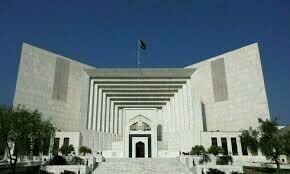ISLAMABAD: Taking exception to the way a sitting high court judge entertained a bail application of an accused and describing the same as “colourable exercise” of jurisdiction, the Supreme Court was compelled to develop guidelines to be followed in future by all the high court judges and magistrates dealing with criminal cases.
The new principles regarding bail matters so developed have been enunciated by Justice Asif Saeed Khosa in a judgement while deciding two review petitions — one filed by litigant Nazir Ahmed and the other by Justice Sayyed Mazahar Ali Akbar Naqvi of the Lahore High Court.
Justice Naqvi instituted the review to get expunged adverse observations made against him in a Supreme Court verdict on Jan 3 last year.
But what followed was a damning verdict in which the apex court observed that filing of a review by an ordinary litigant was run of the mill, but by a high court judge approaching this court in person seeking review of a judgement was surely out of the ordinary. It may raise many an eyebrow in view of the provisions of Article VI of the Code of Conduct for the judges, the verdict said.
The code requires the judges to avoid, as far as possible, getting entangled in litigation.
The controversy came to light when Justice Naqvi accepted a bail application of Nazir Ahmad on the third round after the litigant changed his counsel. The earlier round of bail requests bore no fruit even though the applications were moved with the same grounds.
“If the judge takes a different view and reaches a different conclusion in the subsequent round then he may inevitably invite many allegations, including those of inconsistency or extraneous influence coming into play which may impinge upon his competence, conduct or integrity,” Justice Khosa observed in the verdict.“In these peculiar circumstances of the case this court (Supreme Court) could reasonably entertain an impression that the exercise of discretion in the matter by the judge was ‘somewhat colourable’,” the verdict deplored.
The new guidelines will deal with entertaining and deciding a bail application, its cancellation or suspension of sentence and release of the accused on bail during pendency of an appeal in criminal cases.
The verdict expects that all the courts will scrupulously and meticulously adhere to and follow the new principles that obligate to attach a certificate at the bottom of every bail application regarding non-filing of any such application before the same court previously.
In case of repeated or successive application, a certificate disclosing filing of any such application previously by the same accused, any other accused, the state or the complainant party before the same court in the same criminal case or its cross-case is also necessary.
Such certificate will also disclose the number of previous applications, the date of decision on them and the name of the judge dealing with and deciding the same. No subsequent bail application is to be entertained unless the same is accompanied by copies of the earlier bail application and copies of the orders passed.
Similarly all repeated or successive applications for bail must be fixed for hearing before and heard and decided by the same judge or judges who had dealt with and decided earlier applications unless the judge or judges are not available.
Dismissal of bail applications after attending to the merits of the case amounts to rejection of all the grounds available or in existence till the time of such dismissal, the guidelines emphasised.
In case of dismissal of an earlier bail application on the merits of the case, a subsequent application for the same relief can be filed and entertained only if it is based on a fresh ground i.e. a ground which was not available or in existence at the time of decision of the earlier application.
Likewise withdrawal of an earlier bail application before arguments does not preclude filing of a subsequent application for the same relief before the same court. The court must faithfully record in its order whether the withdrawal of the application had been requested and allowed after arguments on merits or before the hearing of arguments.












































Dear visitor, the comments section is undergoing an overhaul and will return soon.